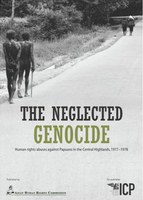
Indonesian
 (Hong Kong/Wuppertal, Thursday, 24 October 2013) The Asian Human Rights Commission (AHRC) and Human Rights and Peace for Papua (ICP) are launching a report on the human rights abuses that took place in the central highlands of Papua, Indonesia during the course of 1977-1978. The report discusses violations under the Convention on the Prevention and Punishment of the Crime of Genocide and aims at truth-building. The report, which was concluded after three years of research by the AHRC, reveals the death of over 4,000 indigenous Papuans, including minors, as a result of operations conducted by the Indonesian military in the area.
(Hong Kong/Wuppertal, Thursday, 24 October 2013) The Asian Human Rights Commission (AHRC) and Human Rights and Peace for Papua (ICP) are launching a report on the human rights abuses that took place in the central highlands of Papua, Indonesia during the course of 1977-1978. The report discusses violations under the Convention on the Prevention and Punishment of the Crime of Genocide and aims at truth-building. The report, which was concluded after three years of research by the AHRC, reveals the death of over 4,000 indigenous Papuans, including minors, as a result of operations conducted by the Indonesian military in the area.
Amongst those who were killed were infants and children, 10 years-old and younger as well as elderly persons aged over 60. The methods of killing commonly used by the military at that time include aerial bombings and strafing by American-supplied OV-10 Bronco planes.
In addition to revealing the details of the murdered victims, the report narrates the stories of survivors who witnessed the brutality and inhumane treatment perpetrated by the Indonesian military at that time. An interviewed survivor, Reverend Matius Wenda (not his real name) shared his experience in witnessing the Indonesian military officers forcing the elderly Papuans to consume their waste. Another victim narrated how the arrested Papuans were forced to stand in line in a field before being shot indiscriminately by the Indonesian military. The victim himself managed to survive by pretending to be dead.
Sexual violence against Papuan women is also reported to have been common during the military operation around the Central Highlands between 1977–1978, as described by one of the interviewed female survivors: ‘Breasts of some women were cut and they died. We were raped, abused and killed… Some women were only raped but others were raped and murdered’.
The AHRC argues that the series of atrocities described in the report amounts to genocide as defined by the Convention for the Prevention and Punishment of the Crime of Genocide adopted by the United Nations General Assembly in 1948. The Hong Kong-based organisation claims that the horrendous human rights violations are attributable to high ranking officials of the Indonesian military at that time, including the former Indonesian President, General Soeharto.
Director for Policy and Programme Development of AHRC, Basil Fernando, states that, “The publication of the report is aimed at raising awareness amongst the general public, particularly in Indonesia, on the history of violence in Papua”.
“The long period of authoritarianism under Soeharto has profoundly silenced the Indonesians from discussing its dark history related to Papua,” the Director explains. He points out that available sources examining the abuses in the Central Highlands during 1977–1978 in Indonesia is very limited.
“Without any recognition from the government and the public at large in Indonesia on the state-sponsored wrongdoings in Papua, the ongoing conflicts in the area will only continue,” Basil Fernando added. He went on to say, “There should be genuine efforts from the government to provide justice for the Papuans, one of which is by fulfilling their right to truth”.
One of the recommendations proposed by the report is the establishment of a local truth and reconciliation commission in Papua as called by the Special Autonomy Law enacted in 2001. It also calls for the government to comply with its international human rights obligations by lifting unreasonable and disproportionate restrictions on freedom of expression in the country to encourage an open discourse on the history of violence in Papua and by ensuring the safety of any individual speaking up on the issue.
The report is available for download in English and Indonesian here.
For further information contact indonesia@ahrc.asia.
About ICP: Human Rights and Peace for Papua is the international coalition of faith-based and civil society organisations that works to address the serious human rights condition in West Papua and supports a peaceful solution to the conflict there.
To support this case, please click here: SEND APPEAL LETTER
SAMPLE LETTER